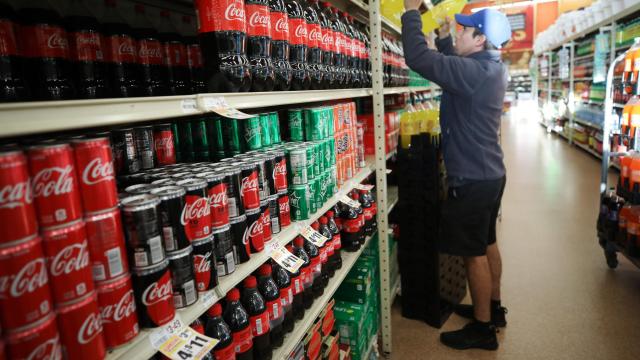New research this week may make diet soda lovers a bit less confident in their habit. The small experimental trial found that some groups of people seemed hungrier and consumed more calories after drinking something with artificial sweetener than they did after drinking a sugary beverage. In particular, those with obesity and women appeared to display more hunger cues, while women ate more food afterward.
Diet sodas and other artificially sweetened beverages have long been a popular alternative for those who want to avoid the empty calories of regular soda but still want that sugary experience. For about as long, though, people have been worried that the artificial sweeteners used to create this illusion are themselves harmful — perhaps even more so than sugar. Diet sodas have been blamed for raising the risk of everything from cancer to blindness to dementia.
The evidence for some of these claims is pretty weak and based on limited observational research, while others have been thoroughly investigated and not validated so far, such as the fear that aspartame causes cancer. Regulators including the Food and Drug Administration continue to insist that artificial sweeteners are generally safe to eat. But other health concerns possibly linked to diet sodas, such as an increased risk of weight gain or type 2 diabetes, are less easily dismissed, with conflicting data on either side.
This new research, conducted by scientists at the University of Southern California, is one of the relatively few studies to experimentally test the effects of diet beverages on the body and the brain. Experimental studies in the world of nutrition are generally rare, partly because they can be very expensive and harder to conduct than a typical drug trial. The data comes from the researchers’ existing project, known as the Brain Response to Sugar study, which tested how the brain responds to eating different types of sugars as well as the artificial sweetener sucralose.
“Our study included both female and male young adults of varying body weights so that we could understand how specific factors, such as a person’s sex or body weight, might impact the way the brain and body respond to artificial sweeteners when compared to real sugar,” study author Kathleen Page, a physician and endocrinologist at USC’s Keck School of Medicine, told Gizmodo in an email.
Seventy-two participants took part in a cross-over trial, where they were made to go through each of the various conditions over the course of three visits. After a 12-hour fast the day before, at 8 a.m. they drank water sweetened with either sucrose (natural sugar), sucralose (commonly known as Splenda), or nothing at all. Before and after the water, they had their blood taken for testing. And about 20 minutes in, they were given a visual test where they were shown pictures of food while undergoing a functional MRI scan. The MRI and blood test results were intended to record signs of unconscious hunger, such as certain patterns of brain activity or fluctuating levels of certain hormones. Two hours after the water, the volunteers were taken to a buffet, where they could eat as much or as little as they wanted.
Page and her team found that people with obesity (a body mass index over 30) seemed to display more signs of hunger in their brain activity during the test after drinking the fake sugar water than they did after drinking the sugar, while there was no difference among overweight and normal weight participants. Similarly, the women in the study seemed hungrier based on brain response than men after drinking the sucralose, and they also ate more calories at the buffet afterwards.
The findings, the authors say, could provide some explanation for the conflicting data that’s been collected so far on diet sodas, by suggesting that the bodily effects of artificial sweeteners could be influenced by other factors.
“Overall, these results suggest that females and those with obesity may be more sensitive to differences in the way the brain and body respond to artificial sweeteners when compared to regular sugar,” Page said. “This could affect the efficacy of artificial sweeteners in some groups, including women and people with obesity.”
The experimental study is one of the largest of its kind, the authors say, but the findings are still based on a relatively small sample size. And while a lab setting has advantages in testing out a hypothesis, it has drawbacks, too. The study can’t tell us anything about the potential long-term effects of drinking diet soda, for instance, and it only looked at one particular artificial sweetener. According to Page, there’s plenty more research that has to be done into how these sweeteners can affect us.
“There are a lot of questions about the effects of artificial sweeteners on hunger and overall health that still need to be tested. For example, we need to know more about how artificial sweeteners impact appetite and metabolic risk when people eat or drink them on a regular basis,” she said. “We also need to study other types of artificial sweeteners, and we need to test how they affect people of different age groups and people with metabolic disorders, such as diabetes.”
